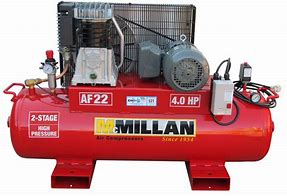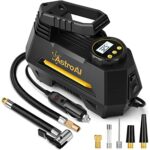
An air compressor is a pneumatic device that converts power into potential energy stored in pressurized air. Air compressors have many uses, including: supplying high-pressure clean air to fill gas cylinders, supplying moderate-pressure clean air to a submerged surface supplied diver, supplying moderate-pressure clean air for driving some office and school building pneumatic HVAC control system valves, supplying a large amount of moderate-pressure air to power pneumatic tools, such as jackhammers, filling high pressure air tanks, for filling tires, and to produce large volumes of moderate-pressure air for large-scale industrial processes. The better air compressor isentropic efficiency has reached 95%. Approximately 70~80% of the air compressor total life time cost is energy consumption, so using the high efficiency air compressor is one of energy saving methods.
Air compressors work by forcing air into a container and pressurizing it. Positive displacement air compressors force air in a chamber where the volume is decreased to compress the air. No two air compressors are the same, and finding out how they work allows you to make informed decisions for the project you’re working on.
It’s based on the energy stored in air that’s under pressure, and the heart of the system is the air compressor. While there are small models that are comprised of just the pump and motor, most compressors have an air tank to hold a quantity of air within a preset pressure range. The compressed air in the tank drives the air tools, and the motor cycles on and off to automatically maintain pressure in the tank.
If you use an air ratchet tool attached to an air compressor, you will get that bolt off in seconds! An air compressor really makes many auto repairs entirely doable by just about anyone. In addition to the uses listed above, there are many other air tools that can be used with an air compressor, and countless jobs around the house that your air compressor will help you accomplish. If, on the other hand, you’re an avid DIYer who is often involved in home projects requiring a variety of air tools, you will need an air compressor with enough capacity to efficiently operate the tools you are planning to use.
An air compressor is a machine that uses an electric motor or gas engine to power a device that sucks in successive volumes of air from the atmosphere, compresses each volume of air in a confined place to increase its pressure by making the volume smaller, and then transfers the high-pressure air to a receiver tank, according to the EnergyTechPro educational website of DTE Energy. An air system also includes purifiers that remove water vapor and compressor lubricant vapors from the compressed air as it is drawn off. Reciprocating air compressors with motors of one to 50 horsepower are sold for home, small shop and light industrial uses where air demand is intermittent, said EnergyTechPro.
If you already own a compressor, you may be surprised by the large variety of uses air compressors have. There are tons of uses of air compressors beyond just the 12 uses we mentioned here! You’ll likely find all sorts of uses for your air compressor. While these air compressors only do one thing – blow compressed air – you’ll likely find that they are useful for way more than you originally expected.
can air compressor catch fire Related Question:
Why does air compressor catch fire?
All air compressors running at 3 bar gauge or higher will have discharge temperatures high enough to cause the air/oil mix to ignite.In piston compressors this is caused by oil carry-over coating the valves and cabonising due to the higher temperatures.
What happens if you leave an air compressor on all night?
Part Failure Should a seal or hose fail at any point in the night, your compressor will run nonstop to try and fill an open tank. If your compressor runs all night without stopping because of a hose split, the risk of a catastrophic motor failure goes up significantly.
Are compressors a fire hazard?
Among the hazards arising from the use of mineral oils as lubricants or coolants in compressors are fires and explosions. Although explosions are rare, the consequences can be serious. Nineteen men were killed in a compressor explosion in Germany in 1963 and seven died on board the MV Capetown Castle in 1960.
Can an air compressor explode in heat?
Intense heat can weaken the compressor tank and lead to a catastrophic accident—a small explosion from one piece of equipment setting off a larger one by rupturing the compressor’s tank.
Is it OK to leave air in compressor?
The short answer is yes, it is perfectly safe to leave an air compressor full. However, this assumes that it has been properly maintained, with regular draining to remove accumulated moisture from inside the tank.
Is it OK to leave an air compressor pressurized?
Leaving an air compressor pressurized does not have any immediate bad effects. Most compressors are designed to tolerate pressurization for a day or two without the tank suffering a catastrophic failure. Doing so has a major drawback. A continuously pressurized tank will weaken its seal.
Can you run an air compressor continuously?
Only those air compressors with a 100% duty cycle can run constantly at the specified pressure and flow. Running an air compressor beyond its duty cycle limit leads to premature wear and tear, higher maintenance costs and, at its most extreme, breakdowns which can shut down production.
What are the dangers of an air compressor?
What are some of the most common hazards related to air compressors? They include electrical dangers, fumes, flying particles, high pressures and high noise levels. Electrical dangers: If an outlet isn’t grounded correctly, it can result in electrical shocks for your operators or irreparable damage for the machine.
Can an air compressor cause carbon monoxide?
Compressed air can be used to supply clean breathing air to respiratory protective equipment. However, there is a risk that the air supplied by compressors powered by internal combustion engines can be contaminated with harmful gases and substances, including carbon monoxide.
What might happen if you use an air compressor in an enclosed area?
Compressors exhaust warm air. So if your system is in an enclosed space, this can cause the room to get warmer and warmer, which will lead to your compressor shutting down on high temperature. You can prevent this by ducting your exhaust air to the outdoors.
Can air compressor tanks explode?
There have been incidents where the air holding tank of a compressor explodes. Although manufacturing defects can caused a tank to explode, the leading cause of air compressor tank rupture is corrosion of the tank from water condensate.
How often should you drain your air compressor?
It is recommended that you drain your tank daily, whether it is manually or automatically. Water build up in your tank can cause the bottom of your tank to rust forcing you to invest in a new tank. If you find yourself forget about draining your tank, you should look into purchasing an electronic drain valve.
Can an air compressor explode in cold weather?
All compressed air system components are vulnerable to damage in cold weather because of the way that condensate moves through the system. Frozen condensate can cause air or water blockages in air compressor accessories and receiver tanks.
How do I dispose of an air compressor?
Do not dispose of the tank in the garbage. Take it to a scrap metal recycler instead. All other components can go in the garbage.
Can you store an air compressor in the garage?
It’s an unheated garage that sometimes goes to -30oC. thanks for your input. Storing it in the cold should be fine. Drain any water before you store it.

